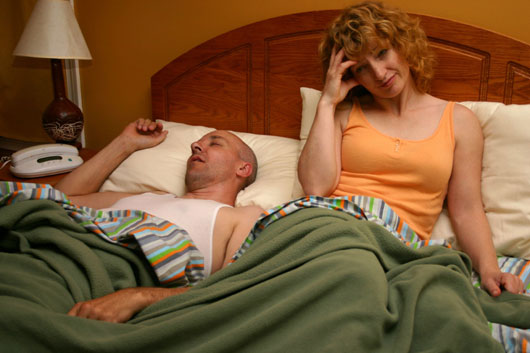Snoring is a sound made by a sleeping person and the sound is omitted when airways narrow thus causing part of the throat or nose to vibrate. Most people who snore are believed to be men and snoring is caused by various factors including but not limited to,
- Excess Weight – being obese or having excess weight makes the throat bulkier thus exerting pressure on the breathing passages resulting to snoring when one is asleep.
- Use of alcohol close to bedtime or sleeping pills will also induce snoring by causing excessive relaxation of the muscles.
- A person having an obstruction of the nasal cavity caused by conditions such as having a cold or sinusitis is more likely to snore.
- The abnormality of the soft tissues that is attached at the hard palate. This soft tissue could be either swollen or excessively long.
People suffering from the sleep disorder that is snoring have had a choice to make on whether toopt for the non-surgical or the surgical methods to do away with the disorder. Though available, surgical methods for treating snoring are being advised to be used as a last resort treatment only if the non-surgical alternatives have been used and exhausted with fail to curing the patient. The non-surgical remedies for curing snoring can be derived from the Webmd.com, some of the most common surgical procedures used to cure snoring today include,
- Uvulopalatopharyngoplasty (UPPP)
- Platal stiffening operations (CAPSO)
- Radio-frequency ablation (Somnoplasty)
Uvulopalatopharyngoplasty (UPPP)
This is a surgical procedure that is mainly effective on patients who have palatal obstruction or simply patients who have both of their side walls collapsing against each other. Excess tissue in the throat is removed surgically so as to widen the airway and ease breathing hence reducing snoring. The tissues removed in this operation are, the uvula (this is a finger-shaped tissue that hangs down into the throat from the back of the roof of the mouth), the soft palate (part of the roof of the mouth), adenoids, tonsils and the pharynx.

Advantages of UPPP
- In the long run it effectively reduces snoring. Statistics base 46% to 73% of patients who have undergone this surgery to be effective.
- Approximately 90% of patient’s improvements have been observed.
- It is recommended by doctors to those patients who do not prefer tracheostomy in treating sleep apnea.
- It is also recommended to those patients who do not choose to use CPAP or do not get better after using CPAP.
Disadvantages of using UPPP
- It is an expensive surgery to undertake thereby depriving the less fortunate in their quest to stop snoring through this method.
- Patients risk difficulty in swallowing as a result of the surgery.
- The patient experiences swelling and pain in the throat. The patient also risks losing blood after surgery due to bleeding.
- The patient stands to experience long-term complications such as voice changes, nasopharyngeal regurgitation, partial loss of taste and persistent palatal dryness.
Platal Stiffening Operations (CAPSO)
This is a surgical procedure performed under local anesthetic and is less invasive as compared to UPPP or LAUP. It is performed in a single surgery and involves the heating of the uvula or soft palate using electrocautery. This results in stiffening of the palate which in turn reduces turbulence caused by breathing during sleeping.
Advantages of CAPSO.
- It is considered less invasive surgery as compared to UPPP thereby few complications and is recommended to most patients suffering from snoring by doctors.
- It is a procedure that is undertaken in one sitting thereby making it convenient.
Disadvantages of CAPSO
- It may need to be carried out on numerous occasions for a patient to reach the desired effect on snoring.
- It is not a cheap procedure to undertake.
- There is pain after surgery which makes patient uncomfortable.
Radio-frequency Ablation (Somnoplasty)
This is a new surgical procedure for curing snoring and is considered to take a minimum of 20 minutes to accomplish. Somnoplasty involves theheating of the uvula and the soft palate at a radiofrequency heat ranging between 77 ° C to 85 ° C. Radiofrequency ablation does reduce the severity of snoring but does not eliminate snoring completely.
Advantages of Radio-frequency Ablation (Somnoplasty)
- Samnoplasty procedure takes a short time to perform.
- It is much less painful as compared to the other surgical procedures for curing snoring
- It is minimally invasive form of surgery.

Disadvantages of Radio-frequency Ablation (Somnoplasty)
- It is an expensive form of surgery.
- It too has to be carried out on multiple occasions for a patient to achieve desired results.
- According to study on patients who have undergone Somoplastry, 7 out of 11 were not satisfied with the procedure citing moderate benefit achieved.
If you are one of the many snorers women/men (that term is listening ugly truth?) that searches internet Natural Remedies to Stop Snoring, you should take a quick decision to go back to sleep and silent as before, take action now.



